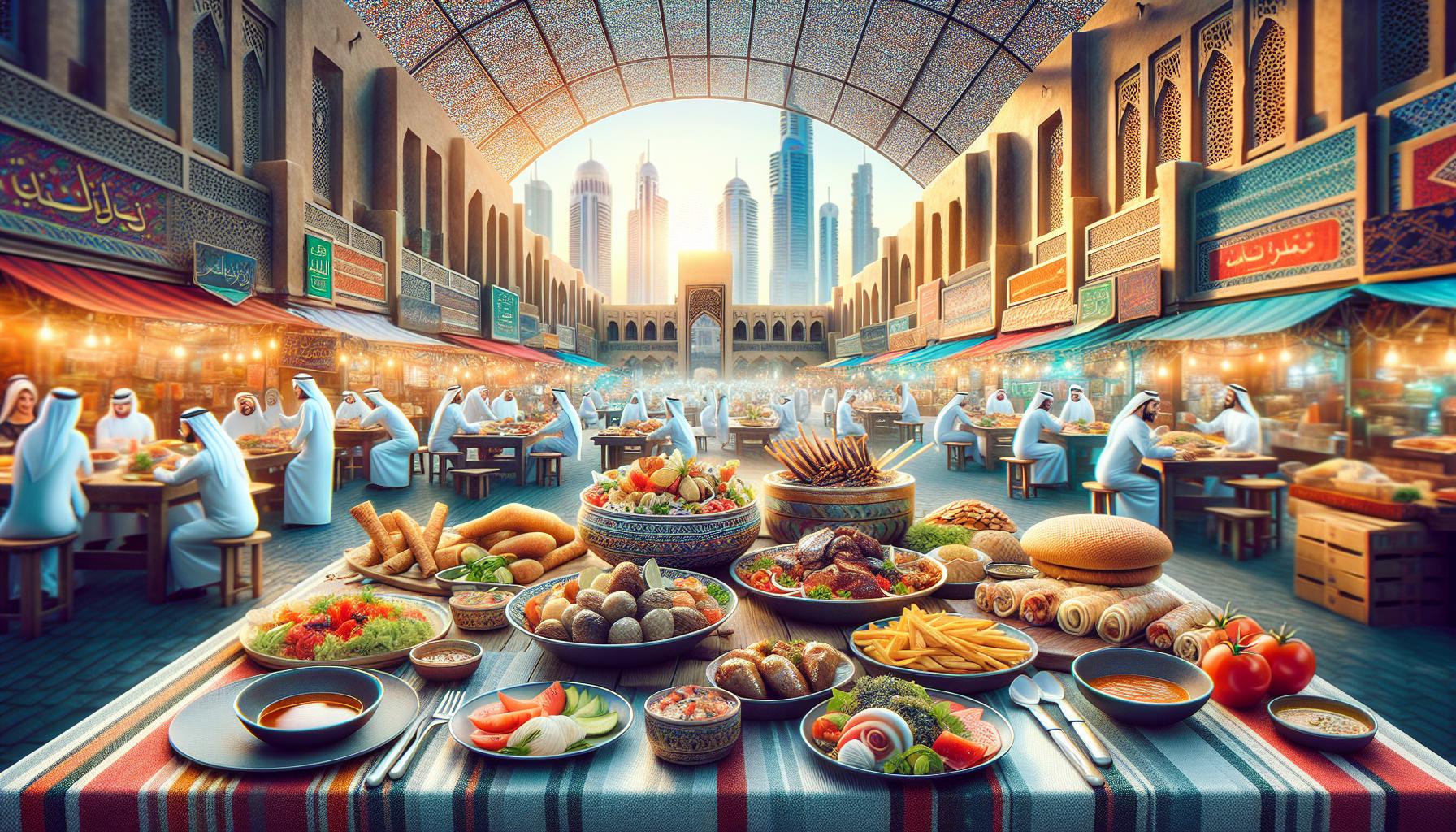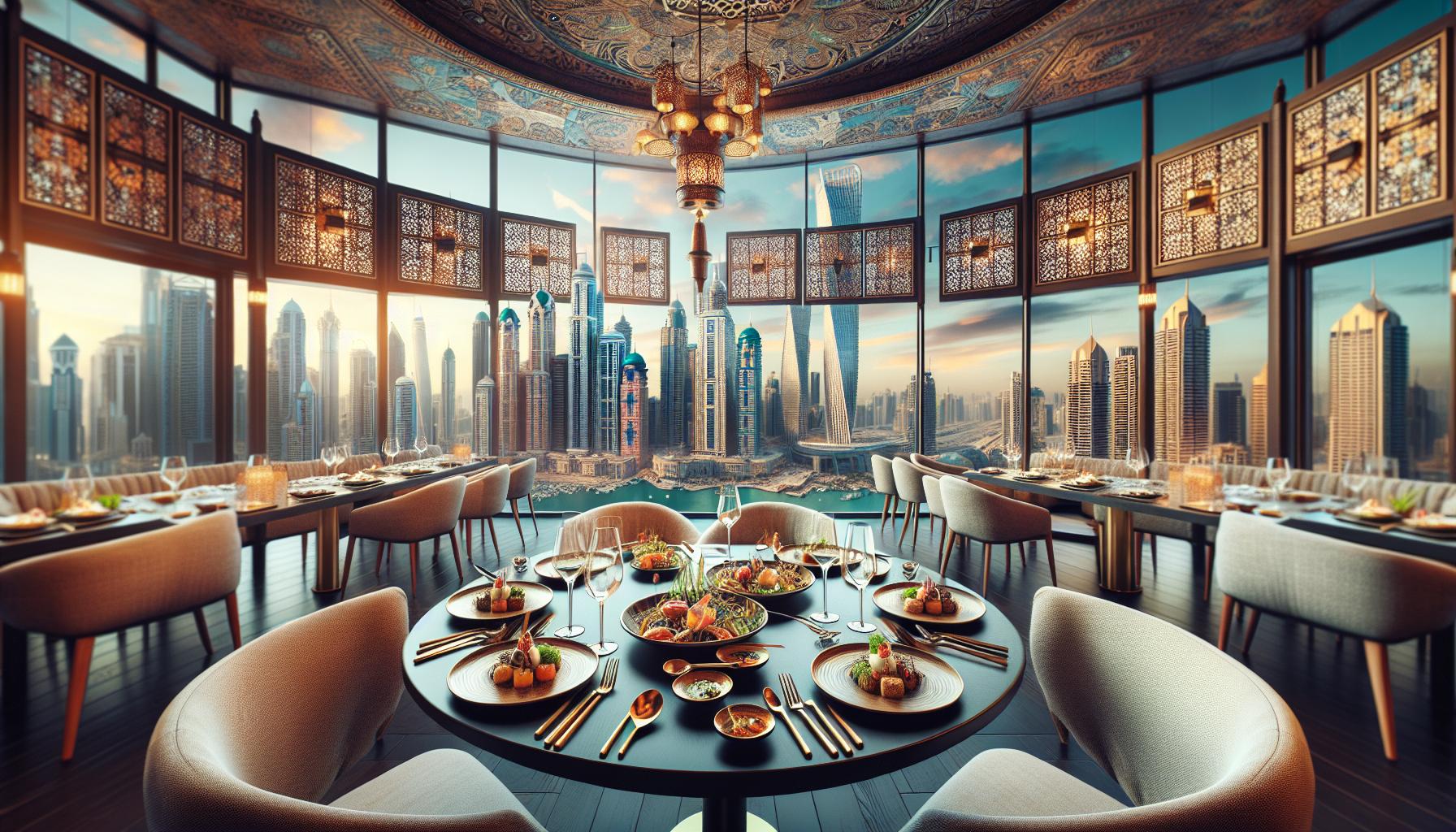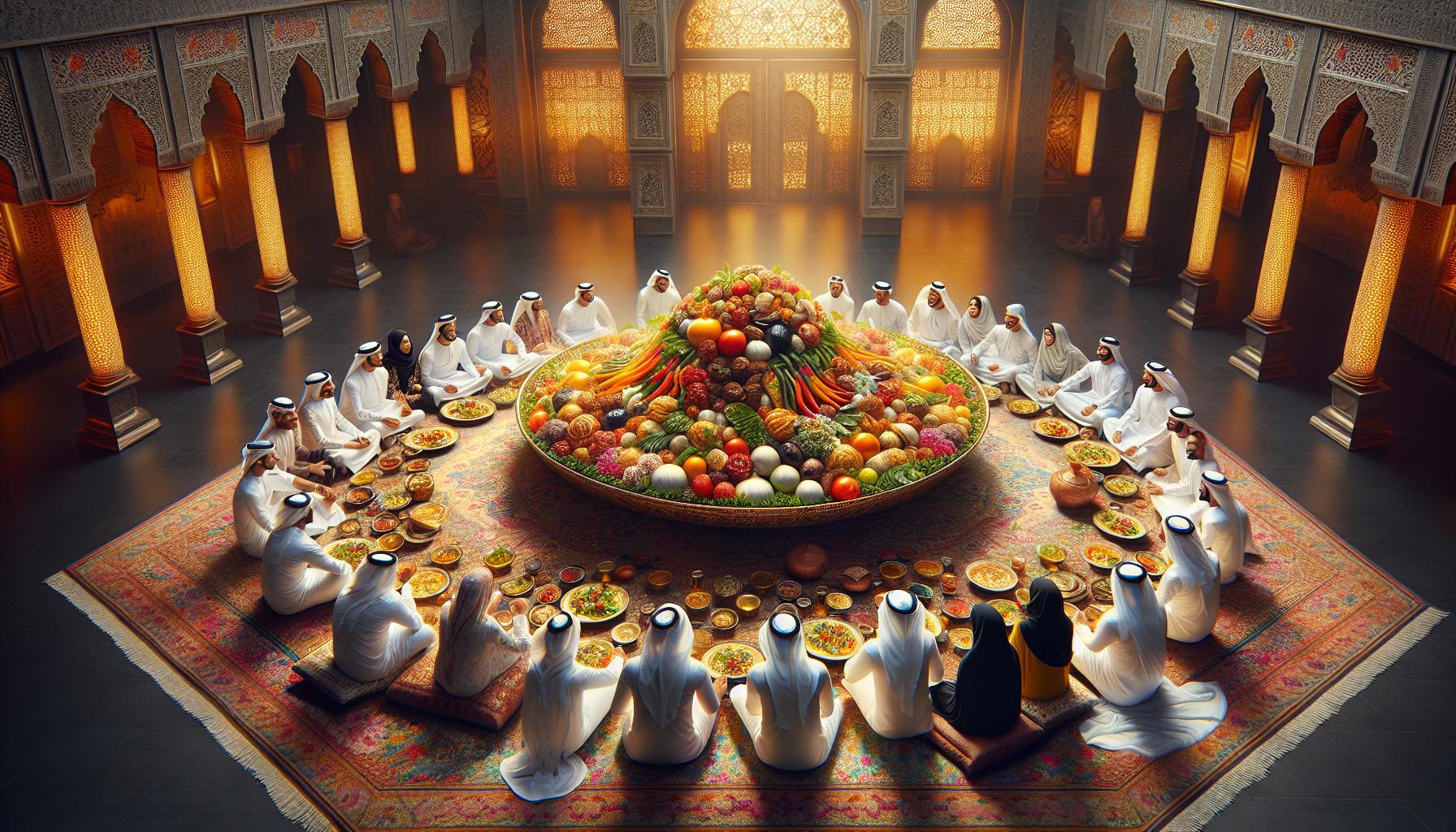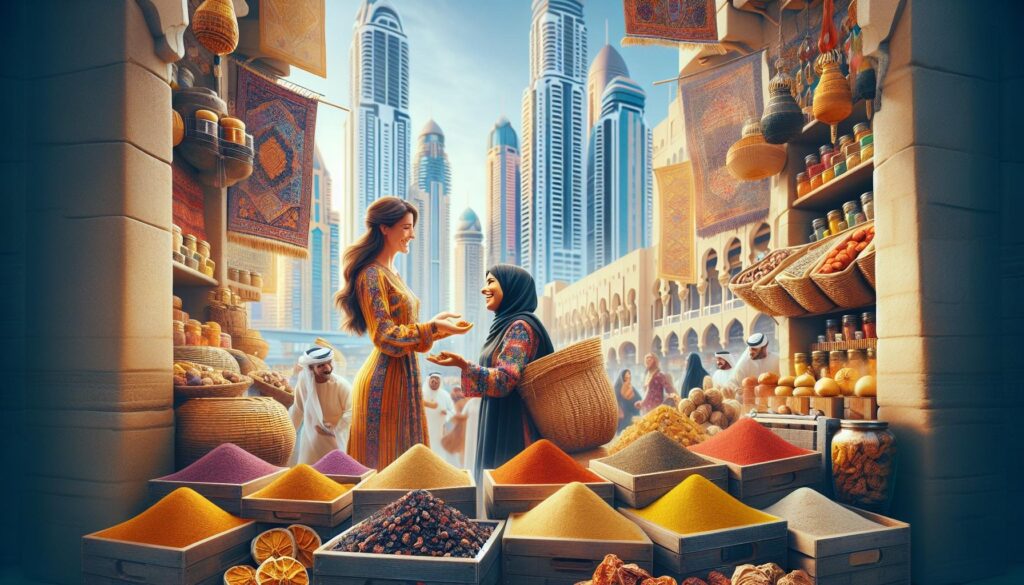Dubai’s culinary scene is a mesmerizing fusion of traditional Middle Eastern flavors and modern international influences. From bustling street food markets to opulent fine-dining establishments this vibrant city serves up a feast for all senses. The local food culture reflects Dubai’s transformation from a humble fishing village to a global metropolis.
In this desert oasis where ancient traditions meet contemporary innovation dining isn’t just about sustenance – it’s an experience. Visitors can savor authentic Emirati dishes like machbous and luqaimat alongside world-class international cuisine. The city’s food culture showcases its role as a melting pot where local Bedouin heritage blends seamlessly with influences from Indian Persian and Levantine cuisines creating a unique gastronomic identity that’s distinctly Dubai.
Dubai Food Culture
Dubai’s culinary heritage spans centuries of cultural exchange along ancient trade routes. The region’s gastronomic identity emerged from its strategic location between East Africa Asia Europe creating a unique fusion of flavors techniques.
Traditional Bedouin Food Customs
Bedouin cuisine forms the foundation of Dubai’s food culture with simple hearty dishes adapted to desert living. Traditional meals center around dates lamb rice with specific eating customs that honor hospitality. Bedouin communities gather around communal plates sharing dishes like Harees (wheat meat porridge) Al Machboos (spiced rice with meat) Thareed (bread soaked in meat stew). The practice of eating with the right hand from shared platters strengthens social bonds within families tribes. Coffee ceremonies remain an essential ritual with Arabic coffee (Gahwa) served in small cups accompanied by fresh dates as a symbol of welcome.
Persian and Indian Influences
Persian merchants brought saffron pistachios rose water to Dubai’s kitchens enriching local flavors with aromatic spices. Indian traders introduced curry spices cardamom turmeric transforming traditional Emirati recipes. These influences appear in popular dishes like Biryani which gained a distinct local interpretation in Dubai’s cuisine. Persian-inspired rice dishes feature prominently in modern Emirati households while Indian flatbreads complement local stews. The spice souks in Dubai preserve this heritage offering ingredients that reflect centuries of trade connections between these regions. Traditional sweet dishes incorporate Persian influences through the use of rosewater saffron in desserts like Luqaimat Umm Ali.
Essential Dishes in Dubai Food Culture

Dubai’s culinary landscape features iconic dishes that reflect its rich cultural heritage. The city’s essential dishes combine traditional Bedouin recipes with influences from Persian, Indian, and Levantine cuisines.
Traditional Emirati Main Courses
Al Harees stands as Dubai’s signature dish, combining wheat, meat, and aromatic spices into a smooth porridge-like consistency. Al Machboos features fragrant rice cooked with tender meat, dried lemon, and local spices. Thareed combines layers of crispy flatbread with slow-cooked lamb stew seasoned with vegetables and traditional spices. Margoogat presents a hearty tomato-based stew with hand-rolled dumplings mixed with vegetables and tender meat. Ouzi presents whole roasted lamb served on spiced rice, garnished with nuts and boiled eggs. These dishes appear regularly at family gatherings, celebrations, and during Ramadan.
Popular Street Food Delicacies
Shawarma dominates Dubai’s street food scene, featuring meat sliced from vertical rotisseries wrapped in Arabic bread with tahini sauce. Manakish offers a pizza-like experience with toppings of za’atar or cheese on freshly baked flatbread. Falafel serves as a popular vegetarian option, crafted from ground chickpeas mixed with herbs and spices. Samboosa presents triangular pastries filled with minced meat, cheese, or vegetables. Luqaimat delivers sweet dumplings drizzled with date syrup, creating a beloved dessert option. Food carts and small restaurants in areas like Al Rigga and Satwa offer these authentic street food experiences at reasonable prices.
The Modern Dubai Food Scene

Dubai’s contemporary culinary landscape reflects its status as a global dining destination. The city’s restaurants combine traditional Middle Eastern heritage with innovative international gastronomy.
International Fusion Restaurants
Dubai’s fusion dining scene features restaurants that blend global culinary traditions with Middle Eastern flavors. Award-winning establishments like 3 Fils merge Asian techniques with local ingredients, creating dishes such as wagyu beef with Arabic spices. Notable fusion venues include Zuma, which combines Japanese izakaya style with Mediterranean influences, and Tresind, known for its modern Indian-Arabic fusion creations. International chefs collaborate with local talent to create unique flavor combinations, incorporating ingredients like za’atar into sushi rolls or adding saffron to risotto. These restaurants showcase Dubai’s culinary evolution through innovative menus that respect traditional flavors while embracing contemporary cooking methods.
Fine Dining and Luxury Experiences
Dubai’s luxury dining establishments set new standards in gastronomic excellence. Michelin-starred restaurants like Stay by Yannick Alléno offer exceptional French cuisine with panoramic city views from the Burj Khalifa. The city hosts 11 restaurants with Michelin stars, including Ossiano’s underwater dining experience at Atlantis The Palm. Celebrity chef outposts such as Gordon Ramsay’s Bread Street Kitchen serve refined British cuisine alongside Dubai’s iconic skyline. These venues feature exclusive wine collections, private dining rooms, and personalized tasting menus. Many establishments incorporate theatrical elements into their dining experience, including tableside preparation, molecular gastronomy techniques, and immersive themed environments.
Dubai’s Unique Dining Traditions

Dubai’s dining traditions reflect deep-rooted cultural values centered around hospitality hospitality and community. These customs shape both everyday meals and special occasions creating unique social experiences.
Communal Eating Practices
Traditional Emirati meals embrace communal dining with large platters placed on floor-spread cloths called sufras. Diners gather around these shared plates sitting cross-legged using their right hand to eat from the communal dish. The host serves the most honored guests first offering prime portions such as the meat near the bone in dishes like Machboos. Common practices include:
- Offering dates coffee as a welcome gesture to guests
- Serving food in large central platters for group sharing
- Following specific seating arrangements with elders seated first
- Using hand-washing stations before after meals
- Leaving a portion of food on the plate to show satisfaction
Ramadan Food Culture
Ramadan transforms Dubai’s dining landscape with distinctive traditions spanning from sunrise to sunset. The fast breaks at Maghrib prayer with dates fresh fruits followed by Iftar feasts. Popular Ramadan specialties include:
- Harees (wheat meat porridge) served in clay pots
- Lamb Ouzi presented on beds of oriental rice
- Thareed (bread soaked in meat vegetables stew)
- Luqaimat (sweet dumplings) drizzled with date syrup
- Special Ramadan beverages like Jallab Qamar Al-Din
Restaurants hotels across Dubai host elaborate Iftar Suhoor buffets featuring traditional Emirati dishes alongside international cuisine creating festive social gatherings.
Dubai Food Festivals and Events
Dubai’s culinary calendar features numerous food festivals celebrating the city’s gastronomic diversity throughout the year. These events showcase local flavors international cuisine culinary innovations.
Dubai Food Festival Highlights
The Dubai Food Festival transforms the city into a culinary playground each February through March for 23 days. This citywide celebration includes signature events like Etisalat Beach Canteen Restaurant Week Dubai Beach Dining Week. Local restaurants participate in special prix-fixe menus ranging from AED 95 for lunch to AED 150 for dinner experiences.
Key festival attractions include:
- Hidden Gems competitions spotlighting lesser-known local eateries
- Masterclasses with international celebrity chefs at cooking demonstrations
- Food truck parks featuring over 30 mobile vendors
- Themed dining experiences across 40+ venues in Dubai
- Waterfront food markets with live entertainment cooking stations
Pop-up Restaurant Culture
Dubai’s pop-up dining scene creates exclusive culinary experiences in unexpected locations. Top international chefs establish temporary restaurants in venues like desert camps rooftop spaces private villas.
Notable pop-up concepts include:
- Desert dining experiences under the stars with Bedouin-inspired menus
- Floating restaurants on Dubai Creek featuring seafood specialties
- Seasonal concepts during winter months in outdoor locations
- Chef collaboration events combining different culinary traditions
- Limited-time specialty cuisine festivals celebrating specific regions
- Custom-designed dining spaces
- Multi-course tasting menus
- Interactive cooking demonstrations
- Wine pairing experiences
- Themed entertainment programs
The Role of Spices and Ingredients
Dubai’s distinctive culinary identity emerges from its masterful blend of aromatic spices and premium ingredients. The interplay of local produce and imported specialty items creates the foundation of Dubai’s renowned gastronomy.
Local Ingredients and Flavors
Local ingredients form the cornerstone of Dubai’s traditional cuisine. Fresh dates from Al Ain oases provide natural sweetness to numerous dishes. Desert truffles (faga) appear seasonally in authentic Emirati recipes. Local fish varieties like Hamour (grouper) and Shaari (spangled emperor) feature prominently in coastal dishes. Native herbs such as za’atar and thyme add distinctive aromatics to traditional preparations. Camel milk products contribute unique flavors to both savory dishes and desserts. Regional produce includes ghaf tree seeds, wild herbs from the desert landscape and locally grown vegetables from modern hydroponic farms.
Imported Specialty Products
Dubai’s strategic position as a trade hub enables access to premium global ingredients. Persian saffron threads color and flavor signature rice dishes. Indian spices like cardamom, cinnamon, turmeric enrich the local spice blend bezar. Mediterranean olive oils enhance both traditional and modern recipes. Japanese wagyu beef appears in high-end restaurants across the city. European truffles garnish luxury dining experiences. Southeast Asian ingredients like lemongrass, galangal and kaffir lime leaves support fusion cuisine. Premium chocolate from Belgium and Switzerland elevates Dubai’s dessert offerings. Specialty grains like Persian Basmati rice form the base of iconic dishes like machboos.

